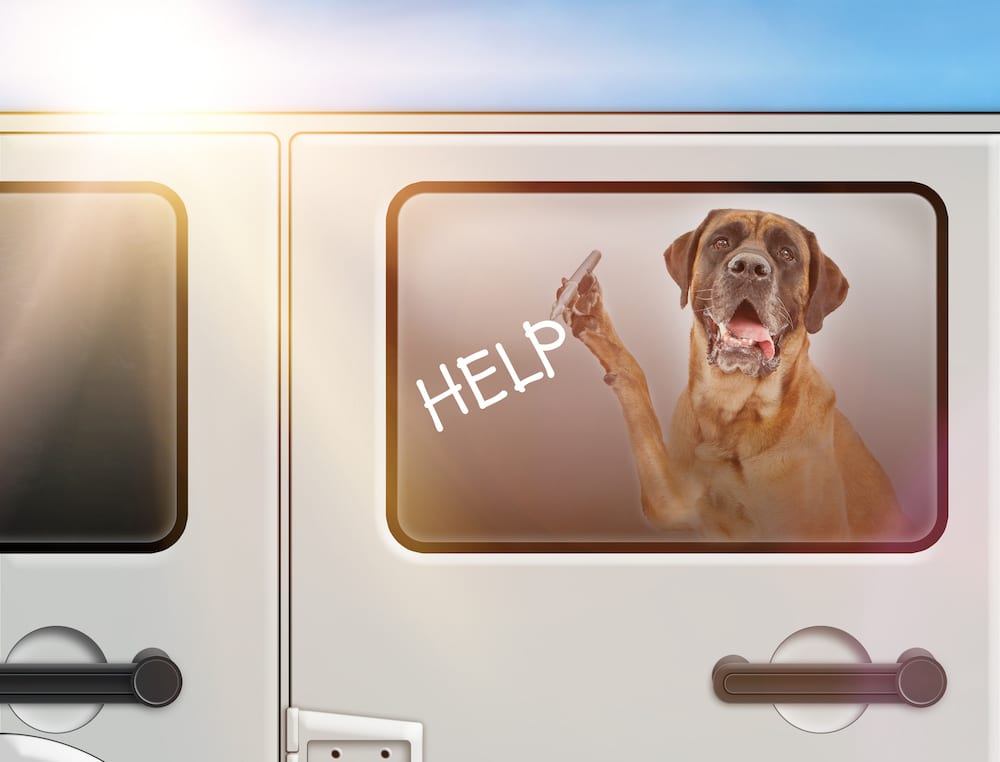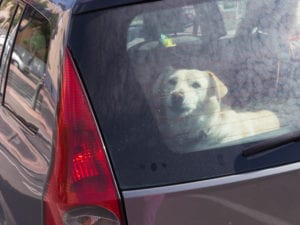
Colorado Dog In Hot Car Law Basic Info
 In August of 2017, the Colorado state legislature passed what’s known as the Dog in Hot Car Law in response to dogs that continue to die when their owners leave their pets in a parked car in the sun. This new law outlines procedures concerned citizens must follow if they need to save an animal locked in a hot car.
In August of 2017, the Colorado state legislature passed what’s known as the Dog in Hot Car Law in response to dogs that continue to die when their owners leave their pets in a parked car in the sun. This new law outlines procedures concerned citizens must follow if they need to save an animal locked in a hot car.
Basic Details: Colorado’s Dog in Hot Car Law
Bill Title: Concerning Immunity for A Person Who Renders Emergency Assistance from A Locked Vehicle
House Bill Number: 17-1179
Colorado Revised Statute Number: 13-21-108.4
CRS Statue Title: Persons rendering emergency assistance from a locked vehicle – exempt from criminal and civil liability
Animals That Can Be Saved Under This New Law: Dogs & cats (Livestock, including cattle, horses, mules, burros, sheep, poultry, swine, llamas, and goats, are not covered by this law.)
People That Can Be Saved Under This New Law: “At-risk” people are defined as an at-risk adult, an at-risk adult with IDD, an at-risk elder, or an at-risk juvenile.
Read Colorado’s Dog in Hot Car Law for Yourself!
This new law says a person is immune from civil or criminal liability for property damage resulting from his or her forcible entry into a locked vehicle if:
- The vehicle is not a law enforcement vehicle; and
- An at-risk person or animal is present in the vehicle and the person rendering assistance has a reasonable belief that the at-risk person or animal is in imminent danger of death or suffering serious bodily injury; and
- The person determines that the vehicle is locked and that forcible entry is necessary; and
- The person makes a reasonable effort to locate the owner/operator of the vehicle, and documents the color, make, model, license plate number, and location of the vehicle; and
- The person contacts a local law enforcement agency, the fire department, animal control, or a 911 operator prior to forcibly entering the vehicle, and the person does not interfere with, hinder, or fail to obey a lawful order of any person duly empowered with police authority or other first responder duties who is discharging or apparently discharging his or her duties; and
- The person uses no more force that he or she believes is reasonably necessary; and
- The person rendering assistance remains with the at-risk person or animal, reasonably close to the vehicle, until a law enforcement officer, emergency medical service provider, animal control officer, or other first responder arrives at the scene.
- If it’s necessary for the person rendering assistance to leave the scene before the owner/operator of the vehicle returns to the scene, or before a law enforcement officer, emergency medical service provider, animal control officer, or other first responder arrives at the scene, and regardless of whether or not the person rendering assistance took the at-risk person or animal to a hospital, an appropriate law enforcement, animal control, or veterinary facility.
- If you have to leave the scene, the person rendering assistance is required to:
- Place a notice on the windshield of the vehicle that includes their name, contact information, and the name and contact information of the location where the person rendering assistance took the at-risk person or animal;
- Contact law enforcement, animal control, or other first responder to advise them of your name, contact information, that you are leaving the scene, and the name and location of where you are taking the at-risk person or animal.
Summary of Colorado’s Dog in Hot Car Law
A person is justified and exempt from criminal liability for criminal mischief, criminal trespass, or criminal tampering involving property if such an action occurred when he or she has rendered emergency assistance to an at-risk person or animal in a locked vehicle, as long as you follow the provisions of Colorado Revised Statue 13-21-108.4 (listed above).
Pet Heat Stroke Quick Guide
 If you have to save a dog or other pet locked in a hot car, you may have to deal with an animal with heat stroke. The temperature inside a car parked in the sun on a 70-degree day will rise by up to 40 degrees (110 degrees) within 30 minutes. If a pet’s body temperature rises to about 105.4 degrees, they will likely get heat stroke.
If you have to save a dog or other pet locked in a hot car, you may have to deal with an animal with heat stroke. The temperature inside a car parked in the sun on a 70-degree day will rise by up to 40 degrees (110 degrees) within 30 minutes. If a pet’s body temperature rises to about 105.4 degrees, they will likely get heat stroke.
Heat stroke is deadly to pets. If you have to bust an animal out of a hot car, follow the procedures stated in Colorado’s new Dog in Hot Car Law.
 Medical research shows that, if you follow the instructions to cool an animal down before you take it to a local veterinary hospital, the animal’s chances of survival improve by 40%. Move fast. But start cooling the overheated animal & then get to a veterinary hospital ASAP.
Medical research shows that, if you follow the instructions to cool an animal down before you take it to a local veterinary hospital, the animal’s chances of survival improve by 40%. Move fast. But start cooling the overheated animal & then get to a veterinary hospital ASAP.
Here are some steps to take to immediately start cooling down a pet you think has heat stroke:
- Get it out of the sun & heat.
- Cool the animal by wetting it down with a hose or a bottle of cool water.
- Offer a drink of cool water but not icy water (but do not force the pet to drink).
- Transport the pet to a veterinarian ASAP.
For more information on what to do if a pet has heat stroke and how fast a car heats up, check out the Sky Canyon Veterinary Hospital Pet Care Blog & read our Pet Heat Stroke Prevention article.
In the meantime, Colorado’s new dog in hot car law provides concerned citizens with the legal means and justification for breaking into a locked car to save a dog, cat, or at-risk person, if you follow the procedures outlined in this new Colorado Statute.
 Sky Canyon Pet Parent Alert: Free Collapsible Pet Water Bowls Available! Bring your dog or cat into Sky Canyon Veterinary Hospital for preventive care or a treatment during the month of May 2018 & we’ll give you a FREE, foldable pet water bowl. (While supplies last!)
Sky Canyon Pet Parent Alert: Free Collapsible Pet Water Bowls Available! Bring your dog or cat into Sky Canyon Veterinary Hospital for preventive care or a treatment during the month of May 2018 & we’ll give you a FREE, foldable pet water bowl. (While supplies last!)
If you think a dog or cat has heat stroke, please call Sky Canyon Veterinary Hospital at 970.985.4911, alert us that you have a possible heat stroke emergency, follow the procedures we’ve outlined to gradually cool down the animal, and then bring them to our hospital for emergency treatment.
Disclaimer: If you have questions about Colorado’s dog in hot car law, consult with your attorney. We are not offering legal advice. We are simply publishing this new law so you can read it for yourself. Thanks!
